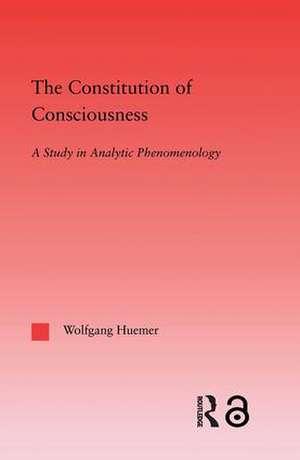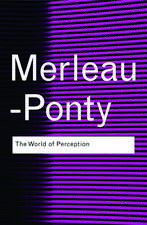The Constitution of Consciousness: A Study in Analytic Phenomenology: Studies in Philosophy
Autor Wolfgang Huemeren Limba Engleză Paperback – 17 iul 2014
| Toate formatele și edițiile | Preț | Express |
|---|---|---|
| Paperback (1) | 479.67 lei 6-8 săpt. | |
| Taylor & Francis – 17 iul 2014 | 479.67 lei 6-8 săpt. | |
| Hardback (1) | 995.54 lei 6-8 săpt. | |
| Taylor & Francis – 13 dec 2004 | 995.54 lei 6-8 săpt. |
Din seria Studies in Philosophy
- 9%
 Preț: 1004.96 lei
Preț: 1004.96 lei - 9%
 Preț: 1037.84 lei
Preț: 1037.84 lei - 19%
 Preț: 478.18 lei
Preț: 478.18 lei -
 Preț: 487.86 lei
Preț: 487.86 lei -
 Preț: 482.74 lei
Preț: 482.74 lei - 18%
 Preț: 1056.28 lei
Preț: 1056.28 lei - 18%
 Preț: 949.78 lei
Preț: 949.78 lei -
 Preț: 478.71 lei
Preț: 478.71 lei -
 Preț: 489.99 lei
Preț: 489.99 lei -
 Preț: 480.28 lei
Preț: 480.28 lei -
 Preț: 481.58 lei
Preț: 481.58 lei -
 Preț: 488.12 lei
Preț: 488.12 lei -
 Preț: 491.68 lei
Preț: 491.68 lei -
 Preț: 436.75 lei
Preț: 436.75 lei - 18%
 Preț: 1056.28 lei
Preț: 1056.28 lei - 18%
 Preț: 1056.63 lei
Preț: 1056.63 lei -
 Preț: 484.47 lei
Preț: 484.47 lei -
 Preț: 488.33 lei
Preț: 488.33 lei -
 Preț: 485.24 lei
Preț: 485.24 lei - 31%
 Preț: 763.39 lei
Preț: 763.39 lei -
 Preț: 482.35 lei
Preț: 482.35 lei -
 Preț: 434.84 lei
Preț: 434.84 lei -
 Preț: 482.35 lei
Preț: 482.35 lei -
 Preț: 480.07 lei
Preț: 480.07 lei -
 Preț: 444.23 lei
Preț: 444.23 lei - 18%
 Preț: 1106.81 lei
Preț: 1106.81 lei -
 Preț: 465.69 lei
Preț: 465.69 lei - 18%
 Preț: 1054.71 lei
Preț: 1054.71 lei - 18%
 Preț: 1056.71 lei
Preț: 1056.71 lei -
 Preț: 483.20 lei
Preț: 483.20 lei -
 Preț: 356.18 lei
Preț: 356.18 lei -
 Preț: 488.33 lei
Preț: 488.33 lei -
 Preț: 223.99 lei
Preț: 223.99 lei -
 Preț: 444.93 lei
Preț: 444.93 lei
Preț: 479.67 lei
Nou
Puncte Express: 720
Preț estimativ în valută:
91.80€ • 95.48$ • 75.78£
91.80€ • 95.48$ • 75.78£
Carte tipărită la comandă
Livrare economică 12-26 aprilie
Preluare comenzi: 021 569.72.76
Specificații
ISBN-13: 9781138011687
ISBN-10: 1138011681
Pagini: 136
Dimensiuni: 152 x 229 x 10 mm
Greutate: 0.23 kg
Ediția:1
Editura: Taylor & Francis
Colecția Routledge
Seria Studies in Philosophy
Locul publicării:Oxford, United Kingdom
ISBN-10: 1138011681
Pagini: 136
Dimensiuni: 152 x 229 x 10 mm
Greutate: 0.23 kg
Ediția:1
Editura: Taylor & Francis
Colecția Routledge
Seria Studies in Philosophy
Locul publicării:Oxford, United Kingdom
Notă biografică
Wolfgang Huemer teaches philosophy at the University of Erfurt, Germany. He is co-editor of The Literary Wittgenstein (Routledge, 2004).
Cuprins
Acknowledgments Introduction Chapter 1 Why Do We Need a Theory of Constitution? Chapter 2 The History of the Notion of Constitution: Two Case Studies 2.1 Why Constitution? Why Husserl? Why Haugeland? 2.2 Husserl's Notion of Constitution: A Short Outline of its Development 2.3 Haugeland's 'Constitutive Standards' 2.4 Some Central Features of Constitution: Contrasting Husserl and Haugeland Chapter 3 Toward a Theory of Constitution 3.1 The Fundamental Difference between the Realm of the Mental and the Realm of the Physical 3.2 Causal Theories and Holistic Background 3.3 Constituting Objects 3.4 Developing Constitutive Commitment 3.5 The Constitution of Mental Episodes Chapter 4 The Social Foundation of the Mind 4.1 In What Sense Are Mental Episodes Social? 4.2 What Kinds of Rational Relation are there? 4.3 Perceptual Experience vs. the Social Dimension of the Logical Space of Reasons: the Brandom-McDowell Debate 4.4 The Social Aspect of the Mind and Phenomenological Analysis Chapter 5 Constitution and Idealism 5.1 A Wittgensteinian Argument 5.2 Constitution and the Realism-Idealism Debate Conclusion Bibliography Index
Descriere
The question of how the mind is related to the world has gained new importance in contemporary analytic philosophy. This work demonstrates that Husserl's phenomenological analyses of the structure of consciousness can provide fruitful insights for developing an original approach to these questions.

















